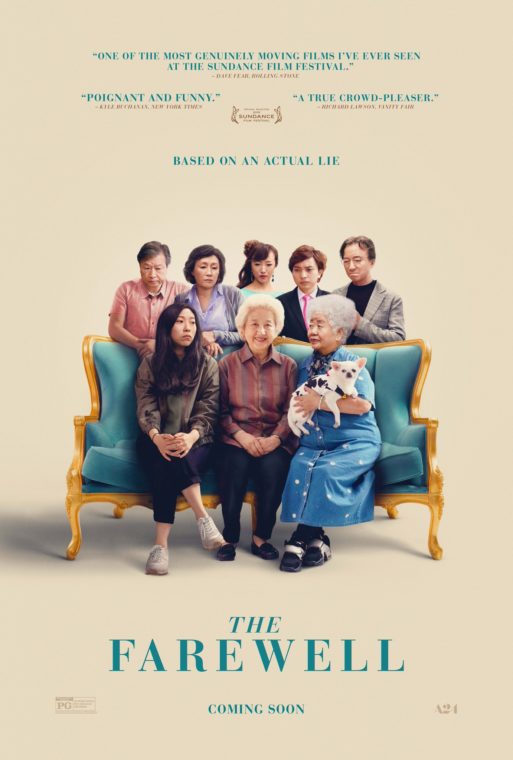
Lulu Wang’s “The Farewell” (2019) is based of her own experiences from visiting her ailing grandmother in China in 2013.
Credit: IMDB
We’ve all withheld the truth from someone, justifying that it would be better if they didn’t know some piece of upsetting information. We say we’re protecting them from that burden. Lulu Wang’s 2019 semi-autobiographical feature “The Farewell” explores this conflict in an emotional, uplifting film laced with enough comedy to bring laughter and tears in equal measure (or both at the same time).
Awkwafina, known for her breakout role in “Crazy Rich Asians,” stars as Billi, a young woman who emigrated from China with her parents when she was 6. Her world is shattered not only by a rejection for a Guggenheim fellowship, but also by the news that family matriarch Nai-Nai has received a dismal cancer diagnosis and has only three months to live. The family quickly decides to keep this information from Nai-Nai and moves a relative’s wedding to their home in Changchun, China, as an excuse for one last family gathering. After being initially encouraged to stay in America because of her perceived inability to cover her emotions, Billi joins her family on their visit, and they butt heads over the decision to withhold Nai-Nai’s diagnosis.
The film navigates Billi’s sense of belonging as she grapples with the possibility of losing one of her strongest and most positive tethers to her home country, as well as the ethical weight of telling “a good lie” over and over again.
Wang penned the script based on her own experiences from 2013, but shifted it into an essay after struggling to find backing in a Hollywood more concerned with telling a love story than family dramedy. The essay then turned into an episode of This American Life in 2016, and producers this time came to her in a bidding war won by acclaimed indie studio A24.
Wang’s personal touch resonates throughout the film as she examines how to handle the disclosure of a potentially life-threatening illness. The sentiment echoed by Billi’s uncle Haibin is that the family shoulders the burden as a form of collectivism at odds with that of Western society. Placing a higher value on individualism and self-determination, Billi takes sides against her uncle at first. Neither side is given more credence than the other, skirting a morality tale that the film may have been coaxed into with a different voice at the helm.

Awkwafina’s Billi steers the comedy-drama with her own questions of
ethics and identity.
Credit: A24
Awkwafina, known for her loud, boisterous comedic relief roles, turns in a compassionate performance as Billi, with one foot in two worlds but belonging to neither of them as she wrestles with grief and loss, all while trying to hide the fact from Nai-Nai. Wang expands on Billi and her family’s relationship with interactions that range from wry to melancholic. Everyone is trying to stuff their grief and hide their tears in sparse moments alone. However, the film weaves in exuberant scenes around Nai-Nai such as her and Billi practice tai-chi in the mornings.
The genius of “The Farewell” is its relatability. Wang forces viewers to confront their own losses of elderly relatives and examine their connections to home, the past and how they live on in a future without them. Toward the end of the film, Nai-Nai gives Billi a hóngbāo, a red envelope containing money traditionally gifted during celebrations such as Chinese New Year or weddings. Refusing Billi’s urges to spend more time in Changchun, Nai-Nai encourages her to spend the money how she chooses, offering that it matters more how you go about doing things than what you actually do.
While not spoiling the film, Wang’s real-life “good lie” has a happy ending. An end-credits card reveals her grandmother to be alive and well.

 “The Farewell” by Lulu Wang
“The Farewell” by Lulu Wang


 How Dare You Die Now!
How Dare You Die Now!
 Debating Medical Aid in Dying
Debating Medical Aid in Dying
 “Help Me, Helen”
“Help Me, Helen”














